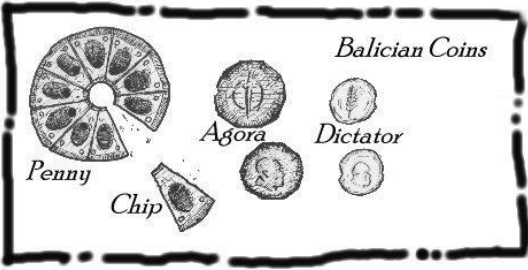Most Balicans regard Andropinis as a necessary evil,
resigning themselves to the fact that the dictator wields
supreme power and isn’t likely to surrender it. Andropinis
routinely arranges the elections of termplars he favors
and directs the Chamber of Patricians to pass the laws
he drafts. From time to time, he indulges idealists and
reformers, allowing corrupt nobles or unsatisfactory templars
to be indicted or voted out. However, the dictator retains
absolute control over the city’s legions and brooks no
defiance of his personal authority
/src/locations/6AAGcS3eRuyyiqtGUpBezdiezV9lnlxXnuMgvqzE.png)
Balic
Population: 27,500 (80% human, 8% dwarf, 3% mul, 4% elf, 4% half-giant, 1% thri-kreen, a few half-elves and halflings; 5% patricians, 55% freemen, 40% slaves). Natives are called “Balikites.”
A wealthy mercantile city-state on the shores of the Estuary of the Forked Tongue, Balic is under the control of Dictator Andropinis a sorcerer-king who claims to have been elected to his throne over seven hundred years ago. Despite the dictator’s grip, Balic is perhaps the most affluent city-state in the Tyr Region and is home to powerful merchant houses that bring great wealth to Balicans fortunate enough to share in the prosperity. The business of Balic is business, and for the most part, Andropinis does not interfere in routine affairs of nobles or merchant emporiums.
A system of five public wells and extensive subterranean
cisterns supplies Balic with water. Most noble villas
have their own cisterns. The city-state depends on the
intermittent rainfall of the months of Sun Descending to
replenish its water stores. In dry years, the praetors enforce
strict water rationing. Balic’s exports include grain, salt,
olives wine, livestock, leather, marble, and a small amount
of copper.
Politics
The Army
Balic's secluded location is quite defensible as far as the armies of other city-states are concerned, for it is impossible to approach the city from any direction except the west. Unfortunately, its close proximity to the Forked Tongue Estuary causes the city more than enough trouble from giants who wade ashore to raid. Every citizen in the city, male or female, slave or freeman, is a member of the militia. On a rotating basis, they spend every tenth month helping the normal army patrol the fields and scrub lands in an effort to reduce the amount of crops and stock lost to raiding giants. The militia is led by General Zanthiros. Andropinis' personal army consists of ten thousand highly disciplined foot soldiers who carry twelve-foot lances, large wooden shields, and thrusting daggers made from sharpened thigh bones of erdlus.

Patricians
Balic’s nobles are known as patricians. The patrician class is composed of the leading landowning families; each family owns a slave-worked estate of grain fields, vineyards, olive groves, and pastures in the lands west of the city. Many of Balic’s most prestigious public offices, such as military command and important templar positions, can be filled only by candidates of the patrician class, so the families amass a great deal of influence by placing their sons and daughters in public service. The dictator theoretically governs with the consent of the Chamber of Patricians (a legislative body made up of representatives from each family), but in practice, the patricians rarely challenge Andropinis. A charge of treason, justified or not, is all the excuse the dictator needs to strip a patrician family of its lands and offices and redistribute them elsewhere. Oriol of Magestalos holds the position of First Speaker of the Patricians.

Praetors
Praetors are the templars of Balic. By popular vote, they
are elected to their offices for 10-year terms. Once they
have won their positions, Andropinis invests them with
the magical power necessary to perform their duties. The
dictator’s minions carefully screen candidates and arrange
voting districts and slates to produce the results that
Andropinis desires. On occasion, an unwanted praetor
is elected despite the dictator’s arrangements; unfortunate
accidents often befall such people shortly after they take
office. Praetors whose terms end without reelection or
who are elevated in anticipation of offices they might
one day hold serve at the discretion of Andropinis.
The most important praetors in Balic, the high praetors,
hold no particular office but stand high in the dictator’s
confidences
Merchant Houses
Trade is the lifeblood of Balic, and the great merchant companies fill the dictator’s coffers with coin. The streets surrounding the open market square known as the Agora are home to large emporiums from other city-states in the Tyr Region, including House Vordon of Tyr, House M’ke of Raam, and House Stel of Urik. The Agora is dominated by three major Balican merchant houses and a dozen or more small ones.
Commoner & Slaves
Many of Balic’s common tradesfolk and artisans belong
to guilds of varying power. Some guilds are strong enough
to force nobles and merchants to heed their demands;
for example, the Potters’ Guild enforces high standards
(and high prices) on Balic’s distinctive pottery, ensuring
that its members earn a good wage from selling the pieces
they produce. Below the common citizens are the slaves,
who make up 40 percent of the city-state’s population.
Slaves enjoy basic protections under Balic’s laws, but the
praetors enforce these laws only in the most egregious
cases of cruelty.
Performing Arts
Ancient ancestors of modern Balikites developed an
elaborate non-religious mythology of fictional parables, like
fairy tales. This legendary world pervades all the city’s
culture, drama, epic poetry, and music.
Poets seldom write their epics; rather, they memorize
and recite them, then teach them to performers called
rhapsodes. A rhapsode recites or sings a portion of some
popular epic as entertainment at patrician gatherings, or
in the agora for the ceramic bits of passersby. Many
rhapsodes compose their own work as well. Within
the dictator’s palace, Orianestra serves as the palace
song mistress.
The cultural scene, though distorted to reflect propaganda
needs, still draws the intense interest of patricians’ and
freemen. The city sponsors competitions among playwrights
and rhapsodes, awarding high honors to those whose work
gains the most favor from the audience.
Citizens attend these competitions in huge numbers,
probably as a refuge from everyday oppression. Because
of this popularity, intellectuals among the Alliance have
begun planting subtle messages of rebellion in their works.
Nothing overt, for everything is translated into mythology,
but a message which is still clear to the more perceptive
members of the audience. Alliance authors have even
used their plays and epics as covert recruitment devices.
Balic Currency

 The city is renowned for its democratic traditions.
The city is renowned for its democratic traditions.
